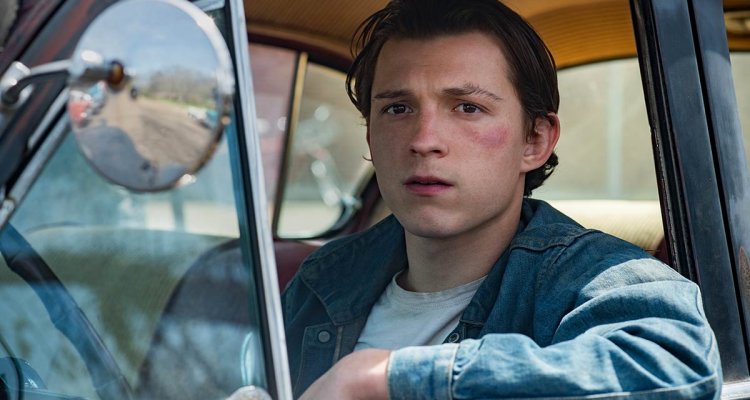It sounds like a winning schematic for success. Start with a less-than-prolific but generally well-regarded director, someone with plenty of international street cred in the indie cinema spheres. Hire every young actor with a festival smash in the last half-decade of their C.V., an embarrassment of talent including Robert Pattinson, Riley Keough, Eliza Scanlen, Mia Wasikowska, Bill Skarsgård, Tom Holland, Haley Bennett, Jason Clarke, Sebastian Stan, and “The Ballad of Buster Scruggs”bit player Harry Melling. Stick them all in an ambitious (the critic’s customary euphemism for “longer than two hours”) literary adaptation about Big National Themes, complete with humid Southern Gothic atmosphere and baroque country speechifyin’ and cycles of violence playing out on interpersonal and global scales through the middle of the 20th century. It may not achieve mainstream popularity, but at the very least, it should be a big auteurist swing polarizing press and earning a faction of ardent supporters.
READ MORE: 2020 Fall Film Preview: 40 Most Anticipated Films To Watch
And yet the combination has somehow ended up as less than the sum of its impressive parts. The latest feature effort from Antonio Campos can’t even rise to the “fascinating yet flawed” zone that eventually merits reappraisal as a misunderstood film maudit. (All things said, this writer’s favorite cinematic genus.) The dialogue, when it can be grasped from beneath a thick layer of cotton-mouthed mumbling, runs the gamut from the ostentatious to the comically banal; at one point, Holland describes receiving a blow job with the mild, tentative language of a seventh-grader. The estimable ensemble appears to have been given contradictory directions in private pre-shoot meetings, resulting in a weird dissonance under which everyone can act like the star of their own movie. Holland believes he’s in a Cormac McCarthy novel, Keough and Clarke do crime pulp with a more modern vibe, Pattinson and Scanlen have stumbled out of a Flannery O’Connor story, and Stan is, at best, present.
READ MORE: Toronto International Film Festival 2020 Preview: 15 Films To Watch
One might be tempted to redirect expectations toward a more morbid strain of enjoyment, but even those hopes would be misplaced. Between interminable bouts of silent grimacing, reams of voiceover narration choke out Campos’ voice for the sake of preserving author Donald Ray Pollock’s prose. Despite featuring all the swampy melodrama and awkward sexuality of, say, “The Paperboy,” this film lacks that one’s redemptive sense of humor about itself. Only Pattinson evinces an understanding that irony may be the one workable option after earnest excellence has been ruled out, the apple-cider-vinegar twang of his voice a valiant effort to enliven the lugubrious flow of scenes. Of all the stupendously bad accent work on display here, only his is as funny as it should be.
Though the long interludes of dead air may confer an impression of sparseness, things feel awfully overstuffed around the rural hamlet of Knockemstiff, Ohio. The volatile Arvin Russell (Holland) will emerge as the linchpin holding the plot together, but first, we’ll spend some time with his dad Willard (Skarsgård) as he educates his boy in the ways of toxic masculinity. Before that, we follow Willard through the devastation of World War II. Elsewhere, the guileless and virginal Lenora (Scanlen) takes a liking to a good-for-nothing preacher charlatan (Pattinson). In another sector of elsewhere, local sheriff Lee Bodecker (Stan) does some dirty dealings with the area’s criminal element. And elsewhere still, a photographer (Clarke) and his wife (Keough) cajole strangers into producing pornographic materials with some light murder peppered in. Campos huffs and puffs in his effort to tie it all together, with narrative contrivances lacking the sheen of the divine that justifies coincidence in these largely regrettable everything-is-connected movies.
READ MORE: The 100 Most Anticipated Films Of 2020
But the wondrous interlinking of fate isn’t the dominant subject Campos chooses to pursue. What he lands on — how patterns of brutality echo out from small towns to international conflicts, as repressed men wage war and exact revenge like their daddies taught them — has more meat on its bone. But Campos nonetheless articulates this notion with the same leaden hand that Alejandro González Iñárritu brought to his Well Isn’t That Convenient trilogy of “Amores Perros,” “21 Grams,” and “Babel.” Campos has been smarter about the delicate confluence of factors that can compel a person to take a life (including their own) in the past, this being the running thesis of his previous features “Afterschool,” “Simon Killer,” and “Christine.” That deft touch seems to have taken leave of him, replaced by lumpy paragraphs of explanation and portentousness.
READ MORE: The Best Films Of 2020… So Far
Like so many characters in this glum, shaggy ramble of a film, Campos gets lost in the woods. Most directors in his position fall victim to overreaching, as ideas overlap and confuse and weaken one another. He makes no such error, instead spreading a humbler film’s sum total of content across an unwieldy canvas. Anyone who’s operated a camera will tell you that that’s the tricky thing about suddenly widening scope; you run the risk of losing focus. [C]

